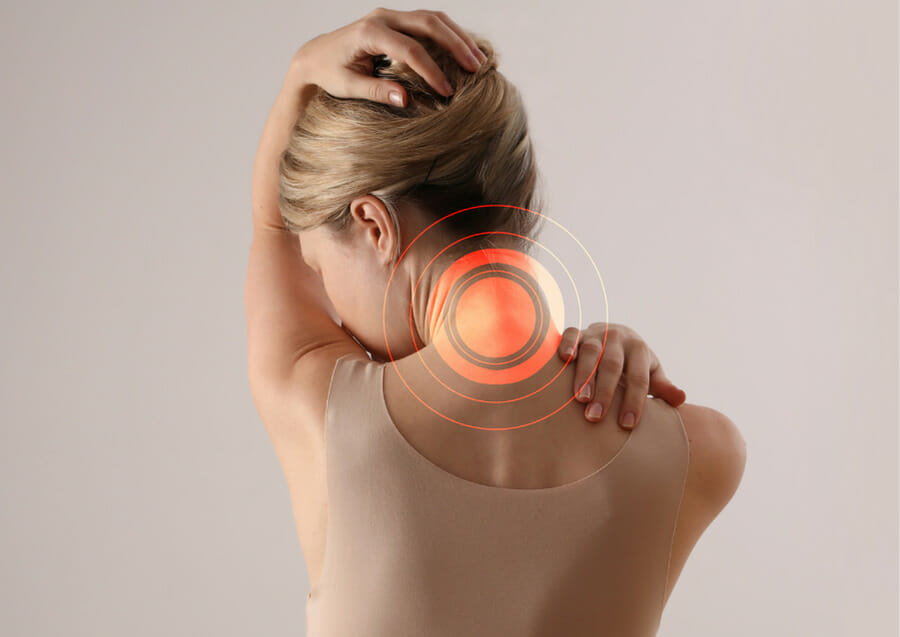Is Your Neck Pain Causing Headache? Find Relief with These Five Effective Tips

According to the World Health Organization (WHO), half to three-quarters of adult people worldwide have had a headache this last year. Unfortunately, a tension headache is one of the most common ailments you can experience. Moreover, some tension headaches tend to resemble migraine headaches, which makes things even worse.
Sometimes, your average pain reliever may not be able to treat your head pain. Headaches, in general, can be triggered by several reasons, although one of the most common ones is a pain in the neck.
In this article, we’ll cover what can cause tension headaches or cervicogenic headaches, as well as five different relief tips you can consider.
Why Is Your Neck Causing a Headache?
Generally speaking, neck pain depends on several reasons, including the muscles at the base of your skull and the top of the neck. Overall, neck pain can cause a headache, but a headache can cause neck pain too.
Your neck can cause a headache due to particular neck problems, which can include chronic neck tension, injuries, or inflammation.
What Causes Neck Pain?
Neck pain, in general, can happen due to poor posture, neck injuries, and neck strains. Other common causes include:
- Excessive phone or computer use
- Bad sleeping position
- Herniated discs
Some referred pain signals your body may send come from:
- Blood vessels in your head/neck area
- Brain tissue
- Nerves around the brain
- Neck muscles and joints
When it comes to a neck problem, you can experience two types of headaches, which are the following:
Cervicogenic Headache

A cervicogenic headache involves both head and neck pain which may mimic the symptoms of a migraine headache. In most cases, it starts as a dull ache in your neck, and it may spread to your temple, forehead, and other areas of your face.
Overall, a cervicogenic headache originates at your cervical spine and could be caused due to a disorder involving your joint, muscle, nerve, or underlying disc. Cervicogenic headaches are known for causing pain in a particular part of the head instead of the entire head.
You can experience a stiff neck, muscle strain, and other problems. Cervicogenic headaches can happen due to neck sprains and fractures or arthritis, although they may also happen after an injury that caused whiplash. People may need to request physical therapy if they feel pain for too much time.
Occipital Neuralgia
Occipital neuralgia headache can trigger pain as a result of underlying neck conditions. It can happen due to injuries to the occipital nerve, which can trigger sharp pain. Some other symptoms include a sensitive scalp, neck movement pain, and pain around your eyes. It’s vital to note that occipital neuralgia isn’t the same as a migraine attack, although they’re both similar.
Common Symptoms of Pain on Your Neck Muscles
Some of the most common symptoms of neck pain include the following:
- Stiff muscles
- Sharp pain
- Soreness
- Radicular pain
- Cervical radiculopathy
- Different types of headaches
- Trouble when lifting objects
There are many relaxation techniques people can try to treat neck issues, but if any of those problems get too severe, you may want to seek medical attention to get a more accurate diagnosis.
5 Relief Tips for Head Pain, Neck Pain, or Tension Headache
Some common treatment options include taking nerve blocks, seeking a massage therapist, or others. However, if you have a mild neck problem, you may consider the following relief tips:
Tip One – Improve Your Posture

Bad posture, such as slouching to see your computer monitor, can certainly contribute to neck pain since you will put extra weight on it. Once you become aware that you’re having a bad posture, consider standing or sitting tall and straight.
One of the best ways to improve your posture is to make your living and working environment more ergonomic. If you tend to sit for many hours, consider investing in a good chair.
Tip Two – Improve Your Sleep
If you’re sleeping in unhealthy positions, consider sleeping in a position that supports your head and neck. This can involve sleeping on your back or side while supporting your head with a pillow.
[Read: Got Neck Pain After Sleeping? Wake Up Pain-Free With These 6 Tips]
Tip Three – Do Exercise
Exercising, particularly low-impact exercises, can help calm your body and ease neck pain/headaches. Try not to strain yourself too much, as this can contribute to more pain.
Tip Four – Apply Heat and Cold Compresses
Depending on your headache type, you may consider applying a cold compress to relieve your head. On the other hand, if you’re experiencing general neck pain or stiffness, you may want to put a heating pad where you’re feeling the pain to ease it.
Tip Five – Manage Your Stress Levels
It may not seem like it, but high-stress levels can cause neck pain and headaches. If you consider that you’re under a lot of stress, practice relaxation techniques, including yoga, meditation, or massages.
As long as you’re relaxed, you have a higher chance of dealing with the pain.
When Should You Consult a Doctor?
Generally speaking, you should consider consulting a doctor when your health conditions get worse. Some of the most common signs include:
- Pain running down your arms
- Stiff neck that leads to high fevers
- Seizures, loss of balance, blurry vision, or slurred speech
- Nausea or unintended weight loss
- Headaches triggered by issues like sneezing, coughing, running, or bending
Frequently Asked Questions
Is It Normal for Neck Pain to Cause a Headache?
Yes, this is because several neck problems can lead to a headache. Some of these problems include irritation, straining, compressing, and other things that can trigger the headache.
How Do You Get Rid of a Neck Headache?
- Improve your posture
- Improve your sleep
- Consider applying cold and hot packs
- Exercise
- Schedule a massage session
- Seek medical help
[Related: 7 Home Remedies for Pinched Nerve in Neck]
How Do You Know If Your Neck Is Causing Headaches?

You may trigger headaches if your neck is experiencing stiffness, inflammation, or swelling. On the other hand, if you have an underlying condition, that may also trigger the headache. In most cases, you may feel sharp pain throughout your head.
When Should You Worry About Headaches and Neck Pain?
You should worry as soon as you start experiencing unusual or recurring pain, and home remedies and over-the-counter medications aren’t easing the discomfort.
Seek Help from A Neck and Headache Pain Specialist
Experiencing pain on one side of the head or the back of the head can lead to a lot of discomfort if left untreated. Moreover, some severe cases may be due to an underlying condition, which makes it more important for people to seek medical help.
If you need any expert opinion, our group of subspecialty radiologists can help you ease the pain. Some of the conditions we treat at Vascular & Interventional Specialists of Prescott through non-invasive treatments include:
- Back pain
- Neck pain
- Varicose veins
- Pinched nerves
- Deep Vein Thrombosis
- Arm and leg pain
- Arterial blockages
- Tumors
We hope this article has helped you, and remember to seek help from an expert if the tips provided above don’t work.
Vascular & Interventional Specialists of Prescott was formed in 2010 by a group of subspecialty radiologists that perform numerous minimally-invasive, low-risk procedures using the tools of our trade for guidance—x-ray, ultrasound, CT scan, and MRI. The team’s goal is to educate patients and medical communities, while also providing safe and compassionate health care, with rapid recovery times and low risk of complications.
